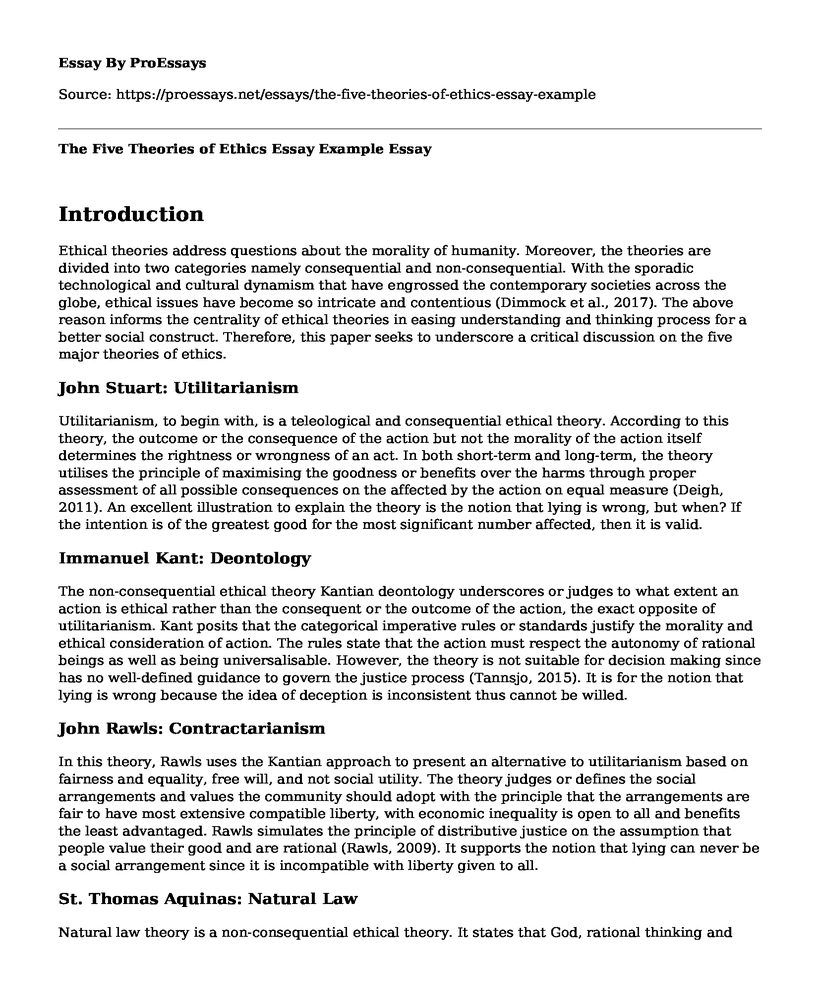Introduction
Ethical theories address questions about the morality of humanity. Moreover, the theories are divided into two categories namely consequential and non-consequential. With the sporadic technological and cultural dynamism that have engrossed the contemporary societies across the globe, ethical issues have become so intricate and contentious (Dimmock et al., 2017). The above reason informs the centrality of ethical theories in easing understanding and thinking process for a better social construct. Therefore, this paper seeks to underscore a critical discussion on the five major theories of ethics.
John Stuart: Utilitarianism
Utilitarianism, to begin with, is a teleological and consequential ethical theory. According to this theory, the outcome or the consequence of the action but not the morality of the action itself determines the rightness or wrongness of an act. In both short-term and long-term, the theory utilises the principle of maximising the goodness or benefits over the harms through proper assessment of all possible consequences on the affected by the action on equal measure (Deigh, 2011). An excellent illustration to explain the theory is the notion that lying is wrong, but when? If the intention is of the greatest good for the most significant number affected, then it is valid.
Immanuel Kant: Deontology
The non-consequential ethical theory Kantian deontology underscores or judges to what extent an action is ethical rather than the consequent or the outcome of the action, the exact opposite of utilitarianism. Kant posits that the categorical imperative rules or standards justify the morality and ethical consideration of action. The rules state that the action must respect the autonomy of rational beings as well as being universalisable. However, the theory is not suitable for decision making since has no well-defined guidance to govern the justice process (Tannsjo, 2015). It is for the notion that lying is wrong because the idea of deception is inconsistent thus cannot be willed.
John Rawls: Contractarianism
In this theory, Rawls uses the Kantian approach to present an alternative to utilitarianism based on fairness and equality, free will, and not social utility. The theory judges or defines the social arrangements and values the community should adopt with the principle that the arrangements are fair to have most extensive compatible liberty, with economic inequality is open to all and benefits the least advantaged. Rawls simulates the principle of distributive justice on the assumption that people value their good and are rational (Rawls, 2009). It supports the notion that lying can never be a social arrangement since it is incompatible with liberty given to all.
St. Thomas Aquinas: Natural Law
Natural law theory is a non-consequential ethical theory. It states that God, rational thinking and natural inclinations, governs universe and humanity. The theory defines what personality one should be, on the principle that goods are self-persevering and that one should promote good, shun evil, and exalt the knowledge of God for an orderly family and society. The theory exalts the natural law of good and evil as the foundation of upright ethics in the society (Graham, 2010). It upholds the notion that lying is wrong because it is harmful to an ordered society and because of a natural inclination to shun evil and avoid offending others.
Tom Regan: Rights Theory
Primarily, the theory upholds the individual's rights as a key ethical virtue. Nonetheless, an individual's rights are limited by the rights of others people. The theory defines what acceptable rights one should have on the principle that individual with inherent moral has put down claims of entitlement to a given type of respect; this creates obligation or duties for others. Regan's upholds the intrinsic values in the human being as being the subject of life since people have beliefs, perceptions, desires, memory, emotions, interest, psychological identity, ability initiate actions and individual welfare (Dimmock et al., 2017). The theory is for the idea that lying is wrong because it is harmful to an individual for various ways.
Conclusion
In conclusion, the ethical theories play a vital role in enhancing understanding about the contemporary moral issues. Ethics being a branch of philosophy that studies morality, critical thinking, and or reasoning aided by the theories is needed to have a clear understanding of the sporadic transformations of societal setups.
References
Dimmock, M., Fisher, A., & Open Book Publishers, (2017). Ethics for A-level. Cambridge: Open Book Publishers
Deigh, J. (2011). An introduction to ethics. Cambridge: Cambridge University Press.
Graham, G. (2010). Theories of ethics: An introduction with readings. London: Routledge.Rawls, P. J. (2009). A Theory of Justice: Revised Edition. Belknap Press.
Tannsjo, T. (2015). Taking life: Three theories on the ethics of killing. New York, N.Y: Oxford University Press.
Cite this page
The Five Theories of Ethics Essay Example. (2022, Aug 18). Retrieved from https://proessays.net/essays/the-five-theories-of-ethics-essay-example
If you are the original author of this essay and no longer wish to have it published on the ProEssays website, please click below to request its removal:
- Land Ethics Essay Example
- The Description of an Ideal Virtuous Person Essay Example
- Personal Identity and Communication Essay Example
- Kant and the Golden Rule - Essay Sample
- Ethics Journal Entries: Accounting Ethic Essay
- Ultimate Questions of Life
- Ethics: Understanding Fairness, Values, and Responsibilities - Essay Sample







